Exploring Avian Intelligence: Top Pet Bird Species
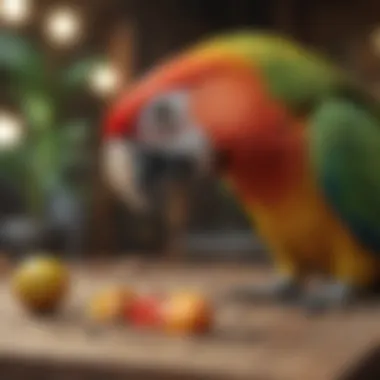
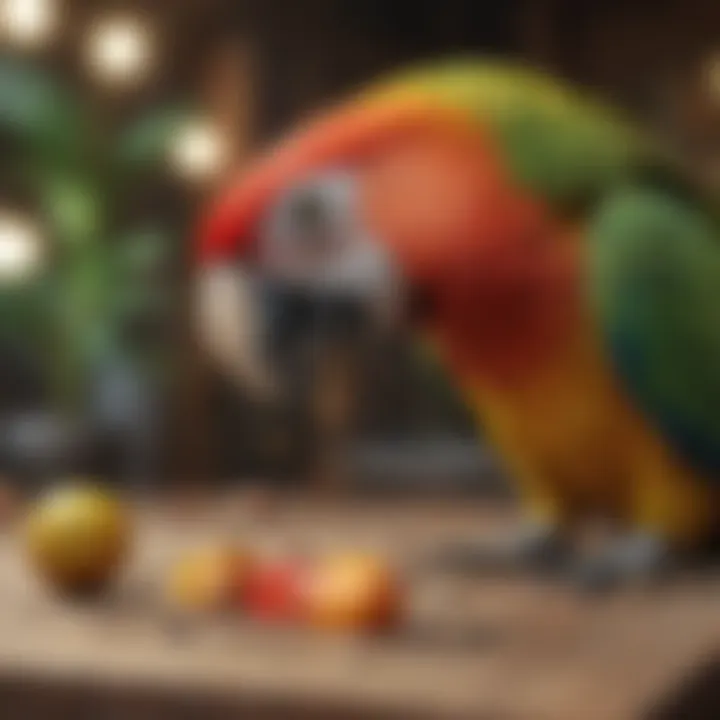
Intro
When we think of intelligent creatures, our minds might drift to dogs, dolphins, or even primates. However, the world of birds offers a treasure trove of cognitive capabilities that often fly under the radar. The reality is, many pet bird species exhibit remarkable intelligence, showcasing their ability to learn, solve problems, and engage socially with both their feathered friends and their human companions. This article dives into the fascinating world of avian intelligence.
Owners of pet birds or those thinking about becoming one will find that understanding these traits is key to fostering a fulfilling relationship with their birds. Not only does it provide insight into the unique behaviors displayed by various species, but it also serves as a guide for enhancing their living environments and keeping their minds stimulated. By taking the time to grasp what intelligence looks like in birds, we enable ourselves to enrich their lives and strengthen our bonds.
Care Tips
Creating a conducive environment for our feathered companions is paramount. With a few thoughtful care practices, bird owners can ensure a well-rounded, stimulating atmosphere. Let's dive into some specific care pointers designed for various avian species.
Daily Care Routines
Routine is the bread and butter of a bird's wellness. Establishing consistent daily practices helps maintain not only their physical health but also their mental stability. Begin your day by providing fresh food and clean water. Observe your bird's behavior during feeding, as this can reveal insights into their happiness and well-being.
Cage Setup and Maintenance
Selecting the right cage is like choosing a house. A suitable cage size depends on the species. For instance, a cockatiel might thrive in a medium-sized cage, while larger parrots need more spacious accommodations. Regular cleaning is crucial. A dirty cage can lead to health issues.
- Daily: Spot clean droppings and leftover food.
- Weekly: Remove all toys and clean perches.
- Monthly: Sanitize the cage with bird-safe cleaners.
Hygiene and Cleaning Practices
The cleanliness of the cage relates directly to the health of your pet bird. It is advisable to use non-toxic cleaning products. Bird owners should regularly check for mold or contaminants, especially in water bowls. Clean surroundings contribute to a happier, healthier bird.
Seasonal Care Adjustments
As seasons change, so do the needs of your feathered friends. Prepare for fluctuations in temperature and humidity by modifying their environment accordingly. In the colder months, consider adding extra warmth with safe heat sources. Conversely, provide ample ventilation and cool spots when summer hits.
Behavioral Insights
Understanding our birds' behaviors can build a bridge of communication. Each bird species has its own unique set of vocalizations and body language. Observing these cues can help owners respond appropriately to their birds' needs.
Understanding Bird Body Language
Birds express their emotions through their postures, movements, and vocalizations. For example, if a bird puffs up, it may indicate contentment or a threat. Similarly, tail twitching might demonstrate excitement or agitation. Learning these signs strengthens the owner-bird bond.
Common Behavioral Issues and Solutions
Behavioral problems often stem from boredom, loneliness, or improper care. For instance, excessive screaming can signal distress or a desire for attention. Recognizing and addressing these issues is key to improving the well-being of pet birds. Engaging them mindfully can reduce problematic behaviors.
Positive Reinforcement Techniques
Training birds can be a rewarding experience. Using treats as a reward for desired behaviors is a smart tactic. Be consistent; this maintains structure and helps the bird understand expectations. A few helpful tips:
- Start with simple commands like "step-up."
- Gradually incorporate advanced tricks to keep your bird engaged.
Social Interaction Needs
Birds, especially social species like budgies and cockatoos, thrive on interaction. Spend quality time daily talking, playing, or even whistling to your bird. Understanding their social nature helps mitigate feelings of loneliness.
Nutrition Guides
Proper nutrition supports your bird's overall wellness, boosting both their intelligence and health.
Essential Diet Components
A balanced diet is vital, incorporating fresh fruits and vegetables along with a high-quality pellet mix designed for their species. Many owners overlook this crucial aspect, which plays a significant role in cognitive health.
Safe and Toxic Foods
Familiarizing yourself with what’s safe or dangerous to feed your bird can save you from mishaps. Common safe choices include apples, carrots, and leafy greens, while foods like avocado and chocolate can be harmful.
Supplements and Treats
Occasional treats can enhance your bird's diet. However, moderation is key. Omega-3 supplements, for instance, can help boost cognitive functions in some species.
Feeding Strategies for Different Species
Various species have specific dietary needs and preferences. For example, African greys benefit from a diet high in antioxidants, while smaller birds may thrive with seed-based diets. Tailor your approach based on the needs of your pet.
Wellness and Health
Maintaining a bird’s health is not just about food and cleanliness; it's also about their emotional and psychological well-being.
Routine Health Checkups
Finding a veterinarian knowledgeable about avian care is indispensable. Regular check-ups can catch potential issues before they escalate. Observing your bird's general condition between visits can inform vets and ensure prompt attention if something seems amiss.
Identifying Symptoms of Illness
Watch for warning signs such as changes in droppings, feathers, or behavior. A lethargic bird or one that refuses to eat warrants immediate attention.
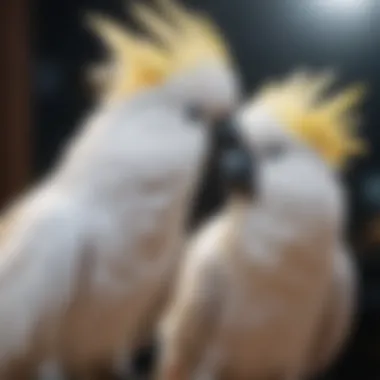
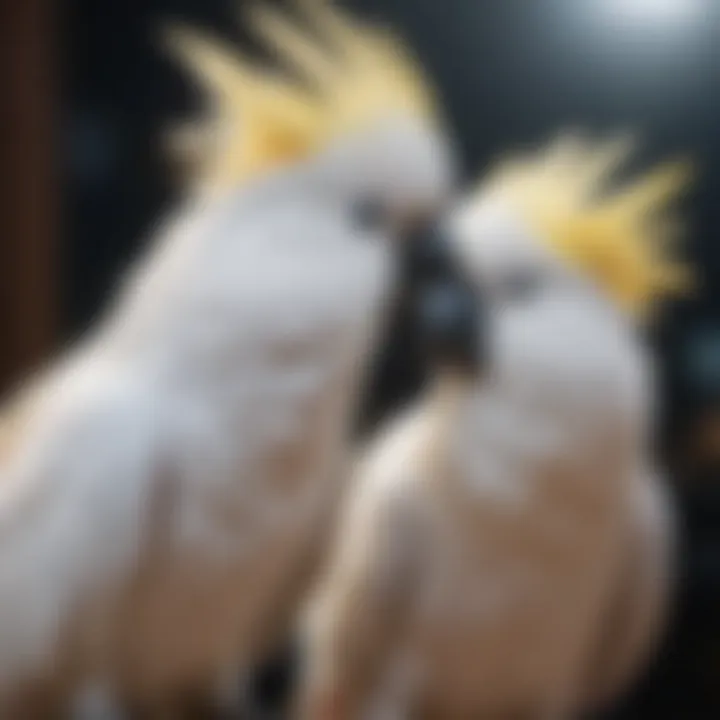
Preventative Care and Vaccinations
Vaccination can be an essential part of your bird's healthcare regimen. Consult with an avian vet. They can advise on what is necessary for your feathered friend based on their species and lifestyle.
Mental and Emotional Well-being
Birds are social creatures and require mental stimulation. Ensure their surroundings are enriched with safe toys and activities to keep their minds sharp.
Enriching Activities
Engaging in playful antics can benefit your pet bird tremendously. This not only nurtures their physical health but also sharpens their mental abilities.
Toys and Playtime Ideas
Rotating toys can keep your bird fascinated and entertained. Choose toys that mimic natural behaviors, such as foraging, chewing, or climbing.
Training and Tricks
Engage your bird by teaching them new commands or tricks. This builds confidence and keeps their intellect honed.
Outdoor Activities and Interaction
If safe, taking your bird outside can be a refreshing outing for both you and your pet. Monitor the weather, though, and ensure your bird is secured and comfortable.
DIY Projects for Mental Stimulation
Get creative with DIY projects, like crafting a foraging toy from cardboard or repurposing items available at home. This creates challenging environments that stimulate their minds.
Recognizing the symptoms of your bird's emotional and physical needs allows for better care and enhances their wellness, leading to a more fulfilling life for both owner and bird.
Understanding Avian Intelligence
Understanding avian intelligence is key for anyone who wants to develop a deep bond with their feathered companions. Birds are often underestimated concerning their cognitive abilities. They showcase a range of intelligence that goes far beyond simple mimicking or resource gathering. Knowing how smart pet birds can be allows owners to create a stimulating environment that caters to their needs.
Recognizing the different types of intelligence in various birds can enlighten pet owners on how to engage them effectively. Each species may display unique cognitive skills, from problem-solving to social interactions. This understanding can lead to enriched lives for both the birds and their human caretakers, improving overall well-being.
By delving into the nuances of avian intelligence, you can ensure your bird's mental health is prioritized. A bird that is kept mentally engaged often displays fewer behavioral issues and seems more content. Plus, incorporating elements that stimulate their minds can foster a stronger human-bird bond. Creating challenges and providing opportunities for socialization reflects a bird's intelligent nature and enhances their quality of life.
Defining Intelligence in Birds
When we talk about intelligence in birds, it usually revolves around their ability to learn from experiences, solve problems, and adapt to changing environments. This varies greatly across species. For instance, some birds can figure out complex puzzles, while others might excel in social contexts, mimicking human speech or creating bonds with their owners.
A simple understanding of bird intelligence can also lead to better care strategies. If you comprehend how birds learn, you can tailor training methods to fit your pet's unique temperament and natural tendencies.
Cognitive Abilities Across Species
Not all birds are created equal in the intelligence department. African Grey Parrots, for instance, are celebrated for their ability to understand language and use it contextually. On the other hand, Cockatoos often shine in social intelligence, displaying remarkable skills in problem-solving and teamwork.
Here’s a broader view on what you can find:
- African Grey Parrots can solve puzzles and understand concepts like quantity.
- Cockatoos are adept at manipulating objects, often using tools in playful yet effective ways.
- Amazon Parrots can mimic speech and often engage actively in social interactions, showcasing their intelligence through communication.
- Budgerigars are surprisingly trainable, often surprising their owners with how fast they can learn new tricks.
In summary, while all species possess intelligent traits, understanding the specific capacities of each can significantly impact how they interact with their environment.
Measuring Intelligence in Birds
Evaluating the intelligence of our avian friends isn’t straightforward. Two main methods emerge: Tests and Experiments, and Behavioral Observations. Both provide valuable insight into understanding the intellectual capabilities of birds.
Tests and Experiments
Tests and experiments focus on quantifying cognitive skills. These can range from simple maze navigation tasks to more intricate patterns needing input and output connections.
- Key Characteristic: Tests are structured, allowing for the evaluation of specific cognitive abilities.
- Benefit: They provide quantifiable data on how birds perform under set conditions, effectively demonstrating their learning and problem-solving skills.
- Unique Features: Tests can reveal nuances in intelligence across species. However, they may not account for variables like emotional state or environmental stressors. Thus, while effective, they might not always reflect natural behavior.
Behavioral Observations
Observing behavior in natural or controlled settings gives another perspective on a bird's intelligence. This method is more qualitative, examining how birds interact with their surroundings, humans, and each other.
- Key Characteristic: Focuses on spontaneous interactions rather than structured tasks.
- Benefit: It can depict a more authentic representation of intelligence in a relaxed context.
- Unique Features: Observations can highlight social learning or creativity, but they often require significant time and careful analysis to draw conclusions. This qualitative approach can sometimes lack the decisiveness of experiments, yet it offers a richer understanding of life as a bird.
In essence, a combination of tests and behavioral observations often provides the best overview of a bird’s cognitive landscape. Understanding these methods deepens the relationship between birds and their human companions, paving the way for improved care and enrichment strategies.
Top Smartest Pet Bird Species
Understanding which bird species consistently demonstrate high intelligence is not just a matter of curiosity; it holds implications for pet care and enrichment. Different species exhibit unique cognitive abilities and behavioral traits that can greatly influence the kind of care they need and the activities that will keep them engaged. Selecting a breed known for its smarts can aid in enhancing the owner-bird relationship and ensuring that these feathered companions thrive in captivity.
African Grey Parrot
Cognitive Skills
The African Grey Parrot stands out as one of the most intelligent avian species, renowned for its exceptional problem-solving abilities. This bird can not only learn a remarkable number of words but also understands their meanings in context, which speaks volumes about its cognitive skills. Such understanding allows these parrots to engage in complex play and problem-solving scenarios that enrich their lives.
A notable feature is their ability to categorize objects. For instance, given different shapes, an African Grey can identify and sort them based on color or size. This capacity to learn and adapt makes them a top choice for pet owners who are keen on mental engagement. However, their intelligence also means that they require substantial mental stimulatoin, otherwise, they may develop behavioral problems.
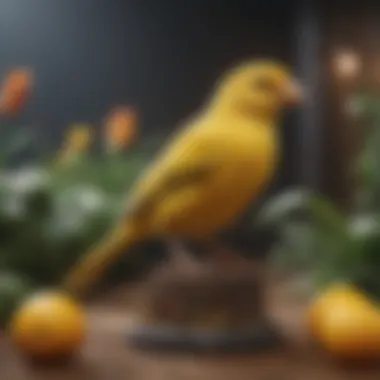
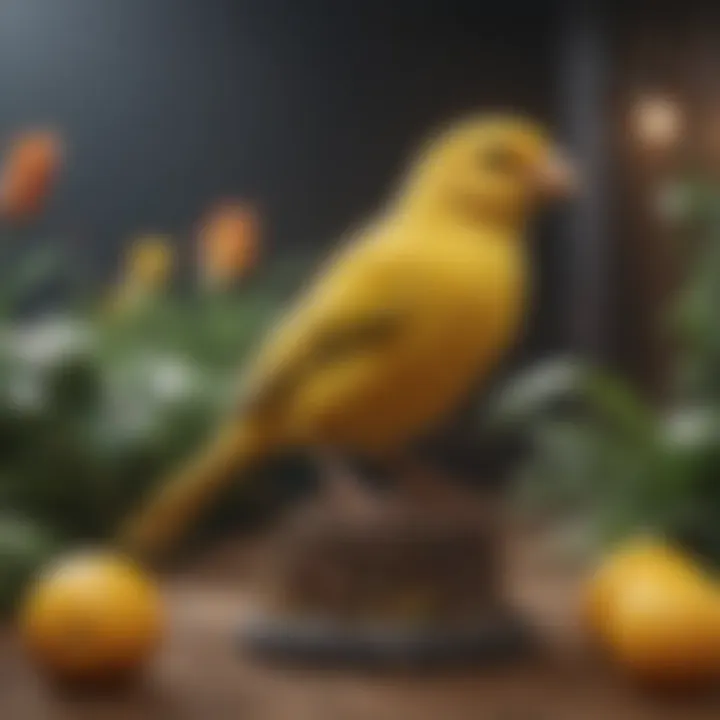
Communication Abilities
When it comes to communication, African Grey Parrots excel, making them particularly engaging pets. Their vocal mimicry skills are nothing short of astonishing, allowing them to replicate human speech and sounds from their environment with great accuracy. For instance, they can copy the sound of bells, phone rinds, or even the laughter of their owners.
To facilitate bonding, pet owners often find that teaching these birds to communicate can enhance interaction. However, one should note that their vocalization can sometimes be overwhelming if left unsupervised, leading to excessive noise that might disrupt the household's peace.
Cockatoos
Problem Solving
Cockatoos exhibit notable skills in problem-solving, engaging in behavior that showcases their intelligence. They are adept at manipulating objects to retrieve food, like opening containers or navigating simple obstacles. This type of intelligence makes them fantastic companions for those interested in interactive play.
The unique characteristic of cockatoos is their persistence. They will often try multiple techniques before figuring out the solution to a problem, demonstrating both creativity and determination. This can be beneficial as it encourages owners to set up various activities that stimulate the bird's mind. But, it's worth noting that without adequate mental stimulation, cockatoos may become bored, leading to destructive behaviors.
Social Intelligence
In terms of social intelligence, cockatoos thrive on interaction with both humans and other birds. They are highly social creatures that form strong bonds with their owners. This sociability is particularly beneficial for pet owners looking for a companion that shares affection.
However, it's important to be mindful that their need for social interaction can be demanding. If a cockatoo is left alone for extended periods, it might develop issues like anxiety or feather-plucking.
Amazon Parrots
Learning and Mimicking
Amazon Parrots are another breed celebrated for their learning and mimicry skills. They can pick up phrases and sounds with astonishing ease, often mimicking their owner's words and speech patterns. This trait allows them to participate in verbal communication, enhancing their relationship with their owners.
Their ability to learn commands is also noteworthy; Amazon Parrots can understand and respond to specific cues. This trainability is not just for convenience but is essential for creating bonding experiences between pet and owner. However, it can be challenging if the parrot doesn’t receive steady training, resulting in confusion or stubbornness.
Social Interaction
These parrots also exhibit profound social interaction tendencies, showing a genuine need to engage with their owners and other birds. They can exhibit playful behaviors, such as games that require cooperation with their human companions.
Nonetheless, it is crucial to ensure they have enough social contact because isolation can lead to behavioral challenges. Owners must find the right balance to ensure their Amazon Parrots feel secure and stimulated.
Budgerigars
Trainability
Budgerigars or budgies are delightful little birds known for their high trainability, especially when it comes to learning tricks and responding to commands. Thanks to their social nature, they often enjoy working in tandem with their owners in training scenarios. This feature can provide significant enrichment for the bird, fostering a lively atmosphere at home.
Their capacity for learning is also advantageous in actively engaging the owner; an owner teaching a budgie new tricks can strengthen their bond. On the other hand, if not trained regularly, budgies may forget commands or develop bad habits that make training more difficult.
Social Behavior
Budgerigars rank highly when it comes to social behavior, thriving on companionship and interaction. Their playful and social demeanor often makes them excellent pets for families or individuals looking for an interactive species. They frequently enjoy chattering and playing games with their owners or other budgies, adding joy to the household.
However, it’s important to ensure they are not kept in isolation. Budgies that lack social interaction may exhibit signs of boredom or aggression, emphasizing the need for consistent engagement.
Ravens and Crows
Tool Use
Among the most intelligent species in the avian world, ravens and crows showcase an impressive capability in tool use. These remarkable birds are known to fashion tools from sticks and leaves to help them obtain food. For instance, crows have been observed using sticks to poke at insects hidden in the bark of trees, displaying an understanding of cause and effect.
This ability to utilize tools enhances their survival skills and makes them appealing to those studying animal intelligence. However, this trait comes with a caveat; they often require a rich environment that allows for exploration and experimentation to fully express this intelligence.
Problem Solving
Ravens and crows are exceptional problem solvers, capable of navigating complex situations that would stump many other species. They can assess a problem, devise a plan, and implement a solution — all evidence of sophisticated cognitive processing.
As such, their problem-solving abilities can be entertaining and educational for those interested in avian intelligence. However, this intelligence demands considerable mental stimulation, as failure to provide it could result in frustrating behaviors or accidents.
Behavioral Traits Indicative of Intelligence
Understanding behavioral traits indicative of intelligence in pet birds is essential for bird owners who wish to foster a thriving companion. Such behaviors not only reflect their cognitive abilities but also provide insight into their well-being. Recognizing these traits can help in creating an enriching environment that aligns with a bird’s natural instincts and promotes mental health. As a consequence, it is vital to observe these behaviors regularly, and by doing so, one might unlock new ways to engage with their feathered friends.
Curiosity and Exploration
Curiosity is a fundamental trait in intelligent birds. It drives them to engage with their environment, whether that be discovering new toys or exploring various areas of their living space. Birds, especially species like the African grey parrot or cockatoos, often show a proclivity for investigating unfamiliar objects. Researchers have found that species with higher levels of curiosity can adapt to changes more readily, indicating a strong link between this behavior and cognitive flexibility.
Birds that exhibit exploratory behavior tend to display an openness to new experiences. For instance, a cockatoo might fly to a new perch and check out a newly introduced puzzle toy, illustrating that their intelligence is often best expressed through their energetic quest for knowledge. This adventurousness is not just mere play; it illustrates a capacity for learning that can be nurtured with stimulating environments and interaction. Therefore, encouraging curiosity can lead to a more fulfilled bird and provide emotional contentment.
Social Learning
Birds are social creatures, and social learning plays a significant role in their intelligence. Observations demonstrate that many species learn effectively from each other, picking up on behaviors or tricks simply by watching their companions. In an environment where they interact with other birds, they are more likely to engage in social learning that enhances their problem-solving skills. For instance, a young Amazon parrot may learn to open a latch by observing an older parrot accomplishing the same feat.
The bond that forms through this type of learning contributes to a richer, social environment. Bird owners who understand this dynamic may choose to socialize their pets with other birds or introduce them to a variety of challenges alongside companions. Positive reinforcement for curiosity leads to greater adaptability and ensures that the complex intelligence of birds continues to flourish. A social atmosphere is therefore part of not just understanding them but also effectively connecting with them.
Problem Solving and Adaptability
Managing to overcome obstacles demonstrates a bird’s problem-solving abilities and adaptability. Different species show varying degrees of skills in this area. For example, the raven is renowned for its ability to use tools to achieve a desired result, a behavior that not only showcases cognition but also foresight. Such actions indicate a kind of intelligence that surpasses basic instinct. Similarly, cockatoos and African greys also exhibit remarkable problem-solving skills that owners may witness during training sessions.
Observing a bird figure out how to retrieve a treat from a novel toy or solve an unexpected issue in their environment (like finding a way out of a corner) is not just entertaining; it reflects their intelligence. Engaging them with challenging toys or puzzles can bolster this adaptive behavior, leading to a happier, more stimulated pet.
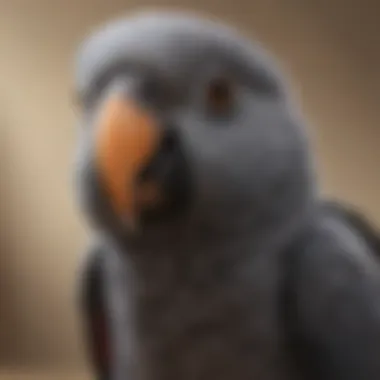

In summary, recognizing these behavioral traits equips pet owners with the knowledge to nurture their birds’ intelligence wisely. By observing curiosity, encouraging social interactions, and providing opportunities to solve problems, owners can significantly enhance their birds' quality of life. Proper engagement not only leads to smarter birds but also strengthens the bond between owner and pet.
Creating an Enriching Environment for Intelligent Birds
Creating a stimulating environment for pet birds is key to nurturing their intelligence and overall well-being. Many bird owners might not realize that, unlike dogs or cats, birds require a notably different approach to mental enrichment. With their high cognitive abilities, certain species can become bored or anxious in a dull setting. Therefore, fostering an engaging environment can not only keep their minds sharp but also prevent behavioral issues that arise from a lack of stimulation.
Toys and Puzzles
When it comes to toys and puzzles, variety is the spice of life. Intelligent species, such as African Grey Parrots or Cockatoos, thrive on challenges that excite them. Here, the goal is to provide toys that require problem-solving skills or dexterity.
- Foraging Toys: These toys mimic the natural behavior of searching for food. They allow the bird to pull, twist, and manipulate objects to access hidden treats, keeping their minds active.
- Interactive Puzzles: Offering toys that respond to the bird’s actions—like those that make sounds or light up—can foster curiosity and engage their attention.
- Chewable Puzzles: Birds naturally chew to keep their beaks healthy. Combining this with a puzzle adds an element of challenge.
The benefits of these toys and puzzles go beyond mere entertainment; they also help in developing fine motor skills and critical thinking.
Social Interaction Opportunities
Birds are inherently social animals. They thrive on interactions, either with fellow birds or their human companions. Without sufficient social engagement, intelligent birds can become withdrawn, anxious, or even aggressive.
- Companion Bird: If feasible, consider adopting another bird. This can help relieve loneliness and stimulate social behaviors.
- Play Sessions: Regular interaction sessions can occur through playtime with the bird using toys or engaging them in simple tasks, such as fetch. Not to mention, talking or singing to your birds can also enhance your bond.
- Training Groups: Joining local bird clubs or online communities on platforms like Reddit or Facebook can help owners connect their birds with others, fostering a sense of belonging.
Creating a social atmosphere not only enriches their lives but also improves communication skills, as birds learn from each other—both in how to talk and interact.
Training Techniques
Effective training techniques build a foundation for trust and communication between you and your bird. Two pivotal methods stand out in promoting intelligent behavior: positive reinforcement and consistency in commands.
Positive Reinforcement
Positive reinforcement is all about rewarding desired behaviors. Every time training is involved, the principle remains simple: reinforce what you want. Using treats, praise, or dedicated playtime can effectively make your bird associate good behavior with something rewarding. This technique encourages quicker learning—many birds respond enthusiastically to this method.
One key characteristic of positive reinforcement is its non-punitive nature. It focuses on what your bird does right rather than what it does wrong, which fosters a relaxed training atmosphere. Moreover, the unique feature of this method lies in its ability to strengthen the bond between you and your pet—birds feel secure and valued. However, relying too heavily on treats can sometimes lead to over-dependence, so moderation is necessary.
Consistency in Commands
Just like humans, birds benefit from clear, consistent communication. Consistency in commands means using the same words and actions for the same behavior every time. This helps the bird associate those commands with specific actions much more effectively. When commands are clear, the likelihood of the pet grasping what is expected increases.
A significant aspect is that it eases the learning process. If you call your cockatoo to come down, using different phrases each time can frustrate the bird and hinder its understanding. The unique feature of this technique is that it promotes a systemized environment where the bird learns to comply more readily. Yet, inconsistency—such as changing commands often or using vague phrases—can confuse and stress birds.
Consistently training with patience eventually leads to more successful outcomes, proving valuable to both pet and owner.
In summary, an enriching environment filled with toys, social opportunities, and effective training techniques can significantly enhance your intelligent bird's life. Owners should consider the delightful challenge of curating an environment that meets these birds' mental and social needs, leading to a happier and more engaged feathered companion.
The Role of Intelligence in Bird Welfare
Understanding how intelligence plays into the welfare of pet birds cannot be understated. Birds, much like humans, thrive when their minds are active and engaged. If a bird's intelligence isn’t fostered over its lifetime, there are potential negative repercussions for both the mental and physical health of these creatures. Just as a puppy with boundless energy requires exercise to remain well-behaved, so too do our feathered friends need mental challenges to stay happy.
Human-bird relationships can flourish through acknowledging the need for mental stimulation. Intelligent birds like African Grey parrots or cockatoos show clear signs of distress or boredom if they are not sufficiently engaged. This boredom can lead to destructive behaviors, such as excessive screaming or plucking feathers, ultimately affecting their well-being. By recognizing these dynamics, bird owners can become better caretakers, enriching their pets’ lives with targeted activities that stimulate their intellectual faculties.
Assessing Well-being Through Behavior
Monitoring a pet bird's behavior is one of the key ways to assess its well-being. Behavior serves as a window through which we can understand a bird's mental state. An active bird tends to exhibit curious exploration of its surroundings, showing interest in toys and interactions. Contrast this with a bird that sits quietly, seemingly disinterested or lethargic. Such signs can indicate that the pet might be feeling mentally or emotionally under-stimulated.
A possible approach to gauge behavioral well-being includes:
- Observation: Take note of the bird's general energy levels. An active and engaged bird is likely enjoying a good state of mental health.
- Social Engagement: How does the bird react to interactions with people or other birds? A friendly and sociable pet indicates better welfare.
- Playfulness: Birds that initiate play with toys or with their owners generally reflect a high level of comfort and happiness.
"Behavior is an unspoken language that tells us so much about a bird's inner world."
By closely observing these behaviors, owners can adjust their care routines to ensure their birds remain intellectually and emotionally fulfilled.
Impact of Mental Stimulation
Mental stimulation has a pronounced positive impact on bird welfare. Healthy activities, such as problem-solving tasks or interactive play, can dramatically uplift a bird’s spirits. Engaging a bird through various methods helps break the monotony of daily life. Here are some benefits of consistent mental stimulation:
- Improvement in Mood: Birds that have their minds challenged are often more jovial and less prone to anxiety.
- Physical Health: Engaged birds tend to be more active, reducing the risk of obesity and related health issues.
- Enhanced Behavioral Skills: Birds that receive adequate mental stimulation are less likely to engage in destructive behaviors, making coexistence more enjoyable for everyone involved.
- Bond Strengthening: Finally, engaging in shared activities not only keeps the pet intellectually stretched but also deepens the bonds between birds and their owners, creating a mutually fulfilling relationship.
In summary, the role of intelligence in bird welfare is both profound and multifaceted. By understanding and implementing effective strategies for mental stimulation, pet owners can enhance the lives of their feathered companions, ensuring they remain not only healthy and vibrant but also deeply connected to their human counterparts.
Culmination: The Value of Understanding Avian Intelligence
Understanding avian intelligence serves as an invaluable asset for pet bird owners and enthusiasts alike. This section draws to light the integral facets of comprehending these cognitive abilities, offering insights into how they significantly impact both the lives of birds and their human companions. By recognizing the intelligence of pet birds, one not only enhances the daily life of these creatures but also builds a deeper, more meaningful bond.
Enhancing the Human-Bird Bond
An informed owner is often a more engaged owner. When individuals grasp the nuances of avian intelligence, they are better equipped to interact with their feathered friends on a level that's both stimulating and rewarding. Activities like problem-solving games, interactive toys, and social interactions all stem from understanding what intrigues birds mentally.
Moreover, awareness of how birds think and learn contributes significantly to trust-building. When an owner takes time to engage a pet bird in challenging tasks that reflect their thinking patterns, it fosters not only competence but also enhances the emotional connection. As bonds strengthen, owners often witness their birds’ personality bloom in response to their attention and interaction. Here are a few ways to enhance this bond:
- Engaging with Play: The right kind of play can serve as both entertainment and a challenge, allowing birds to utilize their problem-solving skills.
- Routine Interaction: Regular interaction can result in a comforting environment, leading to open dialogues in their unique languages.
- Positive Reinforcement: Recognizing achievements with rewards can make a bird feel valued and understood.
Promoting Responsible Bird Ownership
The comprehension of avian intelligence is a critical aspect of responsible bird ownership. Birds are not mere pets; they are complex creatures requiring an appreciation for their innate needs, both physical and mental. Knowledge of a bird’s cognitive abilities helps owners understand proper care strategies and their pets’ specific requirements.
Firstly, to promote responsible ownership, one should ensure that environments are intellectually stimulating. A bored bird is often a destructive bird, leading to behavioral issues. Owners can provide:
- Environmental Enrichment: Toys, perches, and space to explore can help fulfill the natural instinct of curiosity.
- Variety in Diet: A diverse dieta can offer surprising cognitive stimulation, as many birds need to forage for food.
- Regular Social Interaction: Birds are inherently social creatures; leaving them isolated for extended periods can lead to detrimental psychological effects.
Additionally, keeping abreast of the latest research on avian behavior and cognitive science can guide owners to adopt best practices for care and interaction. As pet birds are engaged meaningfully, their quality of life improves, making for a happier and healthier pet.
Understanding intelligence in pet birds goes beyond theory; it is a call to action for owners to not only appreciate the brilliant minds of their birds but also to recognize their responsibilities. With a proper grasp of avian intelligence, we can cultivate not only an enriching habitat for our feathered companions but also foster lasting bonds built on trust, care, and mutual respect.















